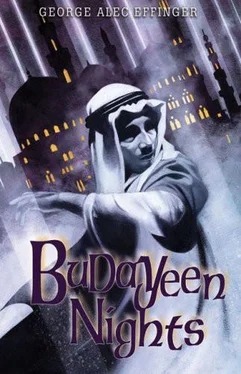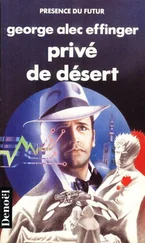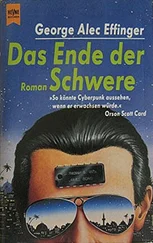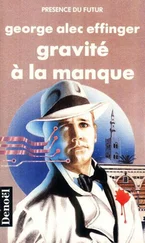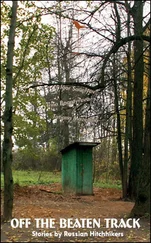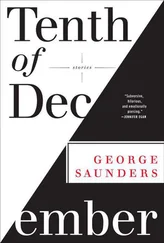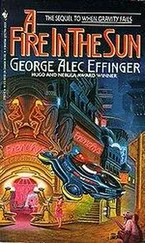Jehan Fatima Ashufi stepped back a few feet deeper into the alley, farther out of the light. All along the Street, people who would otherwise never be seen in this quarter were determinedly amusing themselves. Jehan shivered again and waited. The moment she longed for would come just at dawn. Even now the sky was just dark enough to reveal the moon and the first impetuous stars. In the Islamic world, night began when one could no longer distinguish a white thread from a black one; it was not yet night. Jehan clutched her robe closely to her with her left hand. In her right hand, hidden by her long sleeve, was the keen-edged, gleaming, curved blade she had taken from her father’s room.
She was hungry and she wished she had money to buy something to eat, but she had none. In the Budayeen there were many girls her age who already had ways of getting money of their own; Jehan was not one of them. She glanced about herself and saw only the filth-strewn, damp and muddy paving stones. The reek of the alley disgusted her. She was bored and lonely and afraid. Then, as if her whole sordid world suddenly dissolved into something else, something wholly foreign, she saw more.
Jehan Ashufi was twenty-six years old. She was dressed in a conservative dark gray woolen suit, cut longer and more severely than fashion dictated, but appropriate for a bright young physicist. She affected no jewelry and wore her black hair in a long braid down her back. She took a little effort each morning to look as plain as possible while she was accompanying her eminent teacher and advisor. That had been Heisenberg’s idea. In those days, who believed a beautiful woman could also be a highly talented scientist? Jehan soon learned that her wish of being inconspicuous was in vain. Her dark skin and her accent marked her a foreigner. She was clearly not European. Possibly she had Levantine blood. Most who met her thought she was probably a Jew. This was Gottingen, Germany, and it was 1925.
The brilliant Max Born, who first used the expression “quantum mechanics” in a paper written two years before, was leading a meeting of the university’s physicists. They were discussing Max Planck’s latest proposals concerning his own theories of radiation. Planck had developed some basic ideas in the emerging field of quantum physics, yet he had used classical Newtonian mechanics to describe the interactions of light and matter. It was clear that this approach was inadequate, but as yet there was no better system. At the Gottingen conference, Pascual Jordan rose to introduce a compromise solution; but before Born, the department chairman, could reply, Werner Heisenberg fell into a violent fit of sneezing.
“Are you all right, Werner?” asked Born.
Heisenberg merely waved a hand. Jordan attempted to continue, but again Heisenberg began sneezing. His eyes were red and tears crept down his face. He was in obvious distress. He turned to his graduate assistant. “Jehan,” he said, “please make immediate arrangements, I must get away. It’s my damned hay fever. I want to leave at once.”
One of the others at the meeting objected. “But the colloquium — “
Heisenberg was already on his feet. “Tell Planck to go straight to hell, and to take de Broglie and his matter waves with him. The same goes for Bohr and his goddamn jumping electrons. I can’t stand any more of this.” He took a few shaky steps and left the room. Jehan stayed behind to make a few notations in her journal. Then she followed Heisenberg back to their apartments.
There were no mosques in the Budayeen, but in the city all around the walled quarter there were many mosques. From the tall, ancient towers, strong voices called the faithful to morning devotions. “Come to prayer, come to prayer! Prayer is better than sleep!”
Leaning against a grimy wall, Jehan heard the chanted cries of the muezzins, but she paid them no mind. She stared at the dead body at her feet, the body of a boy a few years older than she, someone she had seen about the Budayeen but whom she did not know by name. She still held the bloody knife that had killed him.
In a short while, three men pushed their way through a crowd that had formed at the mouth of the alley. The three men looked down solemnly at Jehan. One was a police officer; one was a qadi, who interpreted the ancient Islamic commandments as they applied to modern life; and the third was an imam, a prayer leader who had hurried from a small mosque not far from the east gate of the Budayeen. Within the walls the pickpockets, whores, thieves, and cutthroats could do as they liked to each other. A death in the Budayeen didn’t attract much attention in the rest of the city.
The police officer was tall and heavily built, with a thick black mustache and sleepy eyes. He was curious only because he had watched over the Budayeen for fifteen years, and he had never investigated a murder by a girl so young.
The qadi was young, clean-shaven, and quite plainly deferring to the imam. It was not yet clear if this matter should be the responsibility of the civil or the religious authorities.
The imam was tall, taller even than the police officer, but thin and narrow-shouldered; yet it was not asceticism that made him so slight. He was well known for two things: his common sense concerning the conflicts of everyday affairs, and the high degree of earthly pleasures he permitted himself. He, too, was puzzled and curious. He wore a short, grizzled gray beard, and his soft brown eyes were all but hidden within the reticulation of wrinkles that had slowly etched his face. Like the police officer, the imam had once worn a brave black mustache, but the days of fierceness had long since passed for him. Now he appeared decent and kindly. In truth, he was neither, but he found it useful to cultivate that reputation.
“O my daughter,” he said in his hoarse voice. He was very upset. He much preferred explicating obscure passages of the glorious Qur’ân to viewing such tawdry matters as blatant dead bodies in the nearby streets.
Jehan looked up at him, but she said nothing. She looked back down at the unknown boy she had killed.
“O my daughter,” said the imam, “tell me, was it thou who hath slain this child?”
Jehan looked back calmly at the old man. She was concealed beneath her kerchief, veil, and robe; all that was visible of her were her dark eyes and the long thin fingers that held the knife. “Yes, O Wise One,” she said, “I killed him.”
The police officer glanced at the qadi.
“Prayest thou to Allah?” asked the imam. If this hadn’t been the Budayeen, he wouldn’t have needed to ask.
“Yes,” said Jehan. And it was true. She had prayed on several occasions in her lifetime, and she might yet pray again sometime.
“And knowest thou there is a prohibition against taking of human life that Allah hath made sacred?”
“Yes, O Wise One.”
“And knowest thou further that Allah hath set a penalty upon those who breaketh this law?”
“Yes, I know.”
“Then, O my daughter, tell us why thou hath brought low this poor boy.”
Jehan tossed the bloody knife to the stone-paved alley. It rang noisily and then came to rest against one leg of the corpse. “I killed him because he would do me harm in the future,” she said.
“He threatened you?” asked the qadi.
“No, O Respected One.”
“Then-“
“Then how art thou certain that he would do thee harm?” the imam finished.
Jehan shrugged. “I have seen it many times. He would throw me to the ground and defile me. I have seen the visions.”
A murmur grew from the crowd still cluttering the mouth of the alley behind Jehan and the three men. The imam’s shoulders slumped. The police officer waited patiently. The qadi looked discouraged. “Then he didst not offer thee harm this morning?” said the imam.
Читать дальше
